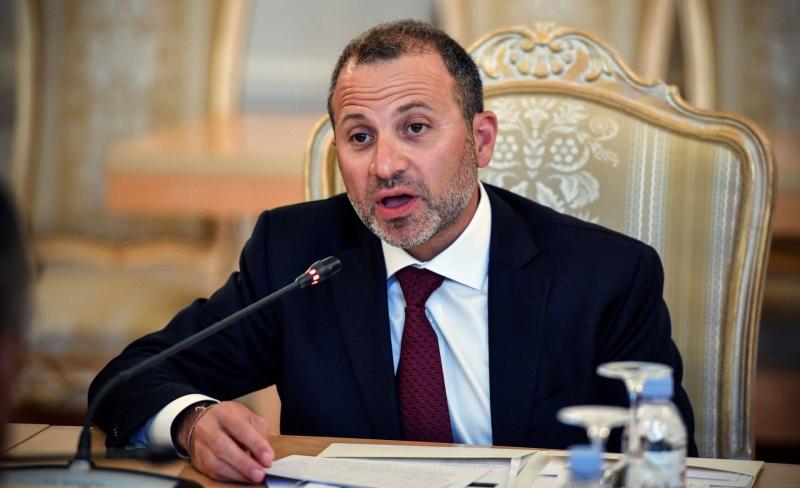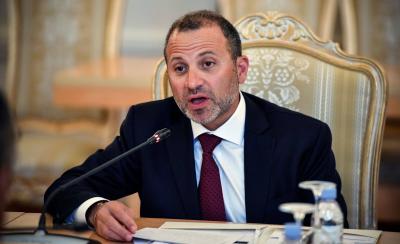The head of the "Free Patriotic Movement," MP Gibran Basil, indicated in an interview with the French newspaper "Le Point" that "the whole of Lebanon must show solidarity with Gaza at both political and humanitarian levels." He stated, "We are for defending Lebanon, not for liberating Palestine by the hands of Lebanese. Therefore, it is the responsibility of Palestinians to free their land and to have their nation with East Jerusalem as its capital, but it is not the sole responsibility of Lebanese to bear this burden; it should be carried by all Arabs."
In response to concerns about the fear that "Hezbollah" might drag Israel into a much larger conflict, Basil said: "There is certainly fear; however, until now, 'Hezbollah' has shown some wisdom and self-restraint in not dragging the country into war, seeing that this is how it supports the people of Gaza, as Israel now finds itself facing multiple fronts in Yemen, Iraq, and Lebanon. Thus, it considers that with this balance of power, Israel cannot attack Lebanon." Basil reiterated in response to whether he truly believed this, stating, "I believe it." He added, "With a 'crazy man' like Israeli Prime Minister Benjamin Netanyahu, you never know. He saves his political life and Israel’s fate and sees that if his country loses this war, he will fail."
Regarding the displacement of one hundred thousand people from northern Israel due to the war, Basil noted that "he has no problem with Israelis leaving their homes because Lebanese people have had to do so many times before and have seen their homes destroyed. Therefore, this issue is not a priority for Lebanese when we have between 400,000 to 500,000 Palestinians who left their homes 75 years ago," asserting that "what matters to us is Lebanon’s interest, which requires us to have internal strength that prevents Israel from continuously attacking us."
Basil considered that "linking a ceasefire in Lebanon to the situation in Gaza puts us at risk, but that does not mean that we do not want to show solidarity with Palestine, not at all," adding, "But given our internal situation, we do not have the capacity to engage in war if we conduct aggressive actions ourselves." He pointed out that "if Hezbollah starts a war, we will not see all Lebanese stand in solidarity with them, especially with all the people who will have to leave their homes in the south." He continued, "On the other hand, if Israel declares war first, we will have to defend ourselves," affirming at the same time that "we are ready to do so, and I am sure we will win such a conflict."
Basil observed that "Hezbollah has the right to fear being attacked by Israel as soon as it finishes its war with the Palestinians," noting, "If that happens, we will be in self-defense, and Lebanon will survive as it possesses resilience that no other country can match." He clarified: "But the damage would be immense, especially since we are already facing a very severe economic crisis," considering that "the fear is that Hezbollah will make the decision to attack Israel alone, which would pose a huge problem because the international community and Arab countries would then blame us for all the damages and refuse to assist us. I doubt that 'Hezbollah' will make such a decision."
He added: "If we are talking about a comprehensive solution that includes the withdrawal from the Lebanese territories occupied by Israel, the return of Palestinian refugees from Lebanon, the return of Syrian displaced persons to Syria, the implementation of UN resolutions, and the Arab initiative of 2002 adopted in Beirut, providing all necessary guarantees for our country to invest in its oil and gas resources and receive assurances about its security, then we can talk about much more than just removing a few kilometers." He explained: "Because once Israel accepts the logic of law and justice, matters will inevitably change," emphasizing that "on the other hand, any partial solution like a ceasefire and a return to the status before 'October 7' can only be based on UN Resolution 1701 as there is no other option." He confirmed that "even if there were a withdrawal on Hezbollah’s part, it would be purely formal because its fighters are from the villages of southern Lebanon, and saying that the resistance will withdraw its missiles above the Litani River will change nothing, as the weapon is capable of hitting any point on Israeli territory. Thus, partial solutions may achieve a degree of calm as happened after the 2006 war, but they will never bring peace and prosperity."
Regarding the political alliance between the "Free Patriotic Movement" and "Hezbollah," Basil stressed that "there has not been a partnership in the true sense of the word. There was an agreement on three main axes: building a state of law that requires reforms and combating corruption; a Lebanese-Lebanese partnership, meaning equal sharing of institutions between Christians and Muslims; and protecting Lebanon under a defensive strategy established through Lebanese dialogue."
He added: "Unfortunately, the issue of building the state has not been properly implemented, and the partnership was not respected by the end of President Michel Aoun’s term, and now we are united only by the protection of Lebanon," pointing out that "here we support 'Hezbollah,' but this is not the same case regarding the issue of 'unity of arenas' between Gaza, Lebanon, Yemen, and Iraq as it is not necessarily in Lebanon's interest." He added, "This can happen when it comes to fighting against ISIS in Syria, but not when it involves interference in the problems between Yemen and Saudi Arabia, as Lebanon has always refused Arab countries' interventions in its internal affairs; why should we interfere in the affairs of these countries?"
In response to a question about whether the understanding between "Hezbollah" and "the Movement" is still in place, he confirmed that it is "still there by a very thin thread," explaining that "now we find ourselves in a state of war, and thus it is essential to maintain a minimum of internal solidarity."
Regarding his reluctance to support Suleiman Frangieh, the candidate from "Hezbollah" for the presidency, Basil viewed it as "a typical example of disrespect for this partnership." He said, "Did anyone commission Hezbollah to appoint our president alone, without at least the approval of its fellow partners in the nation? Hezbollah must respect our choices in this matter, especially since we take into account its security concerns, and we are not in a position aimed at attacking the resistance," pointing out that "we do not want a president who could weaken Lebanon by being a party to it. As long as protecting Lebanon and the resistance matters to us, Hezbollah must consider our eagerness to build the state and the Lebanese-Lebanese partnership."
Basil affirmed that "Hezbollah" does not respect its side of the understanding," explaining: "When they nominated Suleiman Frangieh as their candidate, the country was not in a state of war. Today, the country is at war, and 'Hezbollah' should be in a position to tell its partners that they trust us and that they can agree with us on a figure who cares about our concerns."
He added: "But leaving the situation suspended and waiting until the war in Gaza is over before moving forward is unacceptable," stressing that "the Secretary-General of 'Hezbollah,' Mr. Hassan Nasrallah, confirmed not to link the war with Israel to the presidential elections in Lebanon, which is very good. But this must translate into reality by electing a president, a consensus man, not a candidate who is a party to one portion of the Lebanese against the other."
On the session of June 14, where Jihad Azour and Suleiman Frangieh were candidates, he pointed out that "every MP has the constitutional right to attend or not to attend a parliamentary session," and affirmed: "What is not permissible, which is dangerous, is that a candidate that contradicts the popular representation and outcomes of the recent elections is imposed on all Lebanese," adding: "Jihad Azour is indeed our candidate, but we did not say that there will be no president if he is not elected." He pointed out that "we invite the Shiite duo, 'Hezbollah' and 'Amal Movement,' to dialogue with us to agree on other candidates that everyone can accept; or at least by the majority of Lebanese Parliament members."
Regarding whether the formulation adopted by some in the West describing 'Hezbollah' as a state within a state is, Basil saw it as "the responsibility of the Lebanese. If all Lebanese, who are not Hezbollah supporters, agree to build a state, then Hezbollah won't be able to resist them." He added, "I am against this idea that all the country's problems are the sole responsibility of Hezbollah; this is not true. If it does not contribute to building the Lebanese state, it is responsible in that sense, but Hezbollah is not the only party that bears responsibility."
On whether "the Movement" is responsible for the situation through its alliance with "Hezbollah" for years, Basil rejected this, stressing that "we were allies of Hezbollah to maintain national unity and restore Christians’ rights in the Lebanese state." He explained: "But we have only stood with Hezbollah against the Israeli enemy through our national obligations. We did not arm it, did not pay it money, did not provide it with fighters," asserting that "Hezbollah owes its strength to the internal support it receives from its people and externally from Iran, as well as through the legitimacy bestowed by the entire Lebanese political class on its arsenal, as stated in all ministerial statements since 2005."
In response to a question about why the Lebanese army is not the one defending the country, Basil pointed out that "the reason is that the Lebanese army has been prohibited from being well-armed," indicating that "all of Israel's allies refuse to allow the Lebanese army to be strong, treating it as if it were 'internal police' in Lebanon; therefore this is the responsibility of the international community." He said: "I remind you that UN Resolution 425 issued in 1978 did not allow the Lebanese through diplomacy and international law to liberate their land," adding: "Thus, we had to wait until 2000 for the Lebanese resistance to reclaim the land." He pointed out that "this is why the Lebanese, like many Arab peoples, no longer believe in international law; and this is also why Palestinians, in a state of desperation, turned to 'Hamas.'"
Regarding whether the Lebanese army could eventually replace Hezbollah fighters in the south, as stipulated in UN Resolution 1701, Basil viewed that "the Lebanese army, in its current situation, can play the role of observer or security guarantor," adding: "But it cannot, under any circumstances, defend Lebanon on its own. Even if we have the best army and the best fighters, it is essential to provide them with the necessary arms, and these are the security guarantees I speak of." He indicated that "the United States, ready to provide billions of dollars to the Israeli army, should do the same for Lebanon, noting that 'there is only one thing that can guarantee our security, which is a balance of power between Israel and Lebanon.'"




